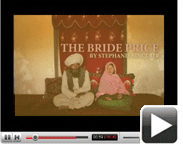Child Marriage: We Have Solutions
We know what works to increase age of marriage in communities where child marriage is common. So why are so few Republicans backing legislation to support those development programs?
"My father and his father,
they talked to each other. They wanted to [marry] their children, but
I was not informed. I was not asked. At that time, I thought of killing
myself."
These are the words of Surita
Shrestha Balami, a Nepali girl who was married at 16. She is one
of 51 million girls who every year are forced to tie the knot before
18. When Surita and other girls marry young, they are more likely to
stop going to school and to live a life of poverty. They often face
serious health complications in childbirth and their children are more
likely to die before their first birthday.
In these ways, this age-old
traditional practice is setting countries back in reaching key development
targets and making U.S. development assistance less effective. Research
from the International Center for Research on Women (ICRW) finds that
child marriage "hot spots" are receiving substantial U.S. development
assistance, including from White House-signature development initiatives
such as PEPFAR, the U.S. global AIDS plan, and the Millennium Challenge
Account, a new U.S. foreign assistance program.
 The Bride Price
The Bride Price
Bills now are before Congress
to curb child marriage as part of broader development efforts (H.R.
3175 and S. 1998). Passage of these bills will ultimately strengthen
U.S. development assistance programs. This should not be an issue of
controversy between Democrats and Republicans in Congress. Yet few Republicans
are supporting this legislation.
This is surprising, especially
given that we know what works to increase age of marriage in communities
where the practice is common. In India and Ethiopia, for example, we’ve
learned that interventions that involve parents and community leaders
can be successful in a relatively short time. The Life Skills Education
Program, developed by ICRW and the Institute for Health Management,
Pachod (IHMP), worked with a community in Maharashtra, India, to develop
a one-year life skills course for girls that focuses on self-sufficiency
and covers a wide range of practical lessons, from how to use the post
office to how to negotiate conversations with their parents. Within
two years of implementing this program, the median age of marriage for
girls increased by one year to 17. In Ethiopia, Pathfinder collaborates
with local partners to form early marriage cancellation committees,
which bring together various community leaders – administration officials,
teachers, religious leaders and parents – to help prevent child marriages.
Community members and girls themselves can report a pending underage
marriage to the committees, which alert local law enforcement to take
action. In one year, these committees helped prevent more than 9,000
marriages in Amhara and 3,000 in Tigray – two regions in Ethiopia
where child marriage rates reach 80 percent and higher.
Given the dire consequences
of child marriage and the fact that it’s a development problem that
we have program solutions for, it would seem that even social conservatives
who might be wary of possible reproductive health connections to the
issue would be able to support the legislation. After all, putting an
end to child marriage has clear implications for keeping girls in school
and improving infant and maternal mortality rates.
To help give momentum to this
issue, ICRW has launched a video campaign that brings to the fore the
reality of our continued inaction. The six-minute video, The Bride
Price, features gripping photographs and first-person testimonies
of child brides in Afghanistan, Ethiopia and Nepal. The photos, taken
by Pulitzer Prize award-winning photojournalist Stephanie Sinclair,
document real child marriages and offer a rare look into the lives of
child brides and parents. The video, produced by ICRW and MediaStorm,
also gives insight into the practice of child marriage from Saranga
Jain, one of ICRW’s lead researchers on the issue.

